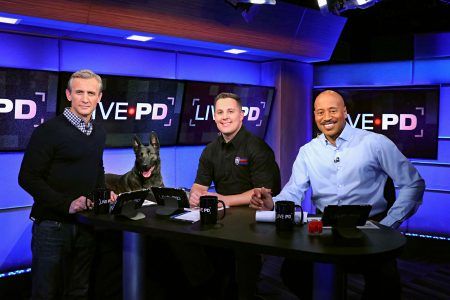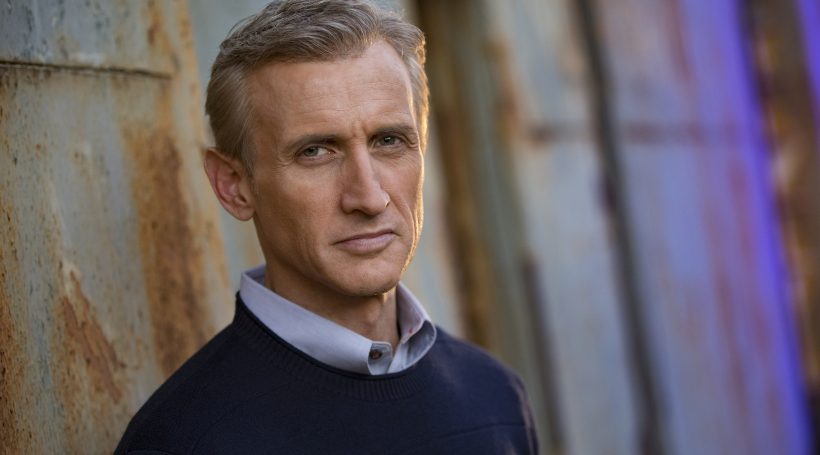Whether or not Dan Abrams believes in destiny remains to be seen, but his career as perhaps the best-known courtroom and legal reporter on television is a fascinating study of nature versus nurture.
“When [my sister and I] were kids, my dad would come and say goodnight to us and tell us about his cases,” recalls Abrams, who appears this month at the Katz JCC Festival of Arts, Books and Culture.
Dad would be Floyd Abrams, constitutional law expert and the courtroom giant who argued for “The New York Times” and journalist Judith Miller in the “Valerie Plame affair” of the early ’80s.
“He’d use it as practice for explaining complicated constitutional issues to a jury,” Abrams says. “I think there was a symbiosis to it as kids. My sister, who’s now a federal judge, was always more destined to have a traditional legal career. But I don’t think he ever viewed me as quite as traditional: he’s a media lawyer, so now he’s got one kid in just about the most prominent job one can have in the legal world, and me on the media side of things.”
 As legal reporting goes, Abrams isn’t just “on that side of things.” He pretty much runs that side of things. After getting his start at Court TV, he’s had stints as chief legal correspondent and chief legal analyst at NBC and ABC respectively, and as the host of ABC’s “Nightline,” plus “The Abrams Report” and “Live with Dan Abrams on MSNBC.”
As legal reporting goes, Abrams isn’t just “on that side of things.” He pretty much runs that side of things. After getting his start at Court TV, he’s had stints as chief legal correspondent and chief legal analyst at NBC and ABC respectively, and as the host of ABC’s “Nightline,” plus “The Abrams Report” and “Live with Dan Abrams on MSNBC.”
In 2016, Abrams moved to A&E, where he hosts “Live PD,” a show that pairs dashcam and handheld camera footage with Abrams’ analysis to offer a glimpse into local policing around the country. Early this year he picked up yet another A&E timeslot with “Grace vs. Abrams.” In each hour-long episode, Abrams and legal commentator Nancy Grace debate the facts of high-profile cases.
And Abrams knows a thing or two about high-profile cases. During the three years he spent with Court TV in the mid-90s, he covered the trials of O.J. Simpson and Dr. Jack Kevorkian – highly publicized trials which decisively shaped the legal news landscape.
“When I started [at Court TV], I was just a production assistant,” Abrams says, “but one with a law degree and an offer from a fancy law firm. Being assigned to cover the O.J. Simpson case was really just a perfect storm of circumstances. All the lead reporters were busy on other cases, and the O.J. thing wasn’t even really a case yet. I was sent as a fill-in, but I kind of became the expert.”
The years that followed found an insatiable public glued to the minute details of sensational murder cases, often as reported or analyzed by Abrams.
“My philosophy is that in the ’90s there was a real rabid interest in high-profile cases, and that was because people were shocked by the reality of it,” Abrams says. “Then in the late ’90s and early aughts, I think the interest waned a bit. My theory is that it’s because that’s when the reality shows started, and they were the more souped-up version of events.”
These things are cyclical, though; that’s Abrams’ explanation for the recently renewed interest in true crime and the popularity of things like the Serial podcast, Netflix’s “Making a Murderer” and, of course, Live PD.
“People came back to trials and true crime because they’ve come to feel like reality shows aren’t real,” he says. “They’re looking for podcasts and shows with real stories. That’s why I started the Law & Crime Network.”
The Law & Crime Network, a legal news website, aims to fill the void left when Court TV transitioned to truTV, airing live coverage of trials and analysis and documentary programming. Abrams sees providing access to courtroom coverage as something of a public service.
“People forget the reason galleries were built in courtrooms was so people could come watch,” he says.
“People also forget that in every criminal case, it’s the people of a state or the people of the U.S. versus a defendant. So in every trial, our appointed or elected officials are representing us with enormous power to take away someone’s freedom. It’s critical for the public to be able to see how these officials are doing what they’re doing. By allowing people to see, you’re providing a window into how the criminal justice system works or doesn’t work.”
He’s also interested in how the media works – or doesn’t. In 2009, Abrams launched Abrams Media with its flagship publication Mediaite. The site covers politics and entertainment in the media industry, playing a role Abrams finds even more vital in the new age of media: criticism and accusations of “fake news.”
“When I founded Mediaite, it was about recognizing that as a cable news host people seemed more interested in what we said than in what politicians said,” Abrams says. “That’s more true today than ever. We do media critique, but Mediaite also extends much broader. It’s a site for consumers who care about the media.”
Abrams is also proud of Mediaite’s efforts to maintain balanced coverage.
“Fox News is regularly very unhappy with our coverage,” he says. “MSNBC is regularly very unhappy, too. But I think the media, no matter which side they fall on, need to be criticized when they are amplifying untruths and celebrated when they’re amplifying accuracy. I think the notion that somehow facts are malleable is dangerous. People can say, ‘Well, these guys are mad at us and so are these guys, so we must be doing it right.’ But it’s also possible that it means we’re terrible. I hope that’s not the case, but I’m not one of these people who’s willing to say because we’re being attacked by both sides we’re the ones who are right.”
As if it weren’t enough to be running an online network and a whole family of news sites, plus hosting two cable TV shows, Abrams has also found time to write. His recent book, “Lincoln’s Last Trial: The Murder Case That Propelled Him to the Presidency,” co-authored with David Fisher, examines an 1859 Illinois murder trial in which Abraham Lincoln argued for the defense. Fittingly, Abrams places the court reporter – a man named Robert R. Hitt – in the role of protagonist.
“It was stunning when my co-author came to me and said there was a transcript out there,” Abrams says.
“It’s the only one of any trial Lincoln argued, and it was only discovered in 1989. Somehow it hasn’t been widely written about. We dug in, not only to the trial, but to everything leading up to it. What was Springfield like at the time? What was Lincoln’s career like? What made this trial such a big deal?”
At present, Abrams is at work on another book in the same genre, and he welcomes the challenge of keeping up with a busy – but enjoyable – schedule.
“I wouldn’t be surprised if the next chapter of my career involved a position in senior management at a major media company,” he says.
“It’ll be after Law & Crime matures and succeeds, and after Live PD, which is certainly the biggest on-air thing I’m doing. It won’t be anytime soon. But right now, with the books and Live PD in addition to Law & Crime and all the websites, I literally don’t have time to do anything else.”














